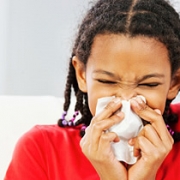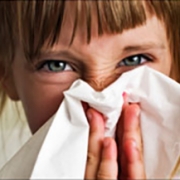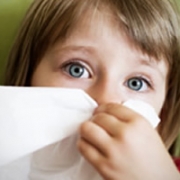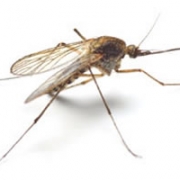
Article at a Glance Reduce allergy symptoms by trying to stay indoors and keeping pollen out of your home. A runny nose, itchy eyes, dark circles under the eyes, and sneezing lasting more than 10 days are all symptoms of a possible allergy. If you think your child might have seasonal allergies, keeping an allergy … Continue reading “Surviving Seasonal Allergies”

Article at a Glance Most sore throats are part of a viral cold, but strep throat is caused by bacteria. Sore throats caused by strep generally last longer and aren’t accompanied by other cold symptoms. Most colds can be treated at home, but strep throat will need to be treated by your pediatrician. What is … Continue reading “Strep Throat Q&A”
Article at a Glance Treating family members who are carriers of staph can potentially reduce recurrent infections. Not all infected people have symptoms. Prevent staph infections by not sharing personal objects like razors and towels, and by keeping toys and household surfaces clean. As staph infections become more of a concern, a new study shines … Continue reading “Family Members of Children Infected with Staph Are More Likely to Be Carriers”

Article at a Glance • Most colds are not serious and only last seven to ten days. • There is no cure for the cold. Antibiotics only work on bacteria, not viruses. But there are many things you can do to relieve the symptoms. • If your child is younger than three months old, be … Continue reading “Colds: When Should You Call Your Doctor?”

Article at a Glance • It can be difficult to diagnose allergies because symptoms often vary dramatically or are similar to other conditions. • Keeping a diary of symptoms and looking for patterns can help your pediatrician make a diagnosis. • Allergies are not curable, but you can help your child relieve symptoms and avoid … Continue reading “The 411 On Allergies”

Article at a Glance • Weather can affect your child’s asthma. • Keeping an asthma diary can help you and your child’s doctor identify any triggers. • You can help reduce your child’s asthma attacks by avoiding triggers. Whether it is wind, rain or sun, it isn’t uncommon for weather conditions to cause problems for … Continue reading “Weathering My Child’s Asthma”

Most parents know to keep an eye out for eating disorders like bulimia and anorexia, but few have heard of another common eating disorder — binge eating. People with the disorder have frequent episodes of eating abnormally large amounts of food. They feel unable to control what and how much they are eating. The disorder … Continue reading “Have You Ever Heard of Binge Eating Disorder?”

West Nile Virus is most commonly transmitted by mosquitos to humans, birds, horses, and some other mammals. The most severe diseases caused by the West Nile virus are: • West Nile Encephalitis (inflammation of the brain) • West Nile Meningitis (inflammation of the membrane around the brain and the spinal cord) • West Nile Meningoencephalitis … Continue reading “West Nile Virus”

As many as 50 million Americans have some kind of allergy and about 8% of children have a food allergy. An allergy is when the immune system overreacts to a normally harmless substance. The immune system tries to “protect” the body by releasing chemicals to fight against the invading allergen. These chemicals are what cause … Continue reading “Does My Child Have an Allergy?”

You make sure your child sees the doctor and the dentist on a regular basis, but what about the eye doctor? Eye health is also a vital part of your child’s well being. Here’s some information that will help you keep your child’s eyes healthy. Children should have their eyes tested periodically before the age … Continue reading “Your Child’s Vision”